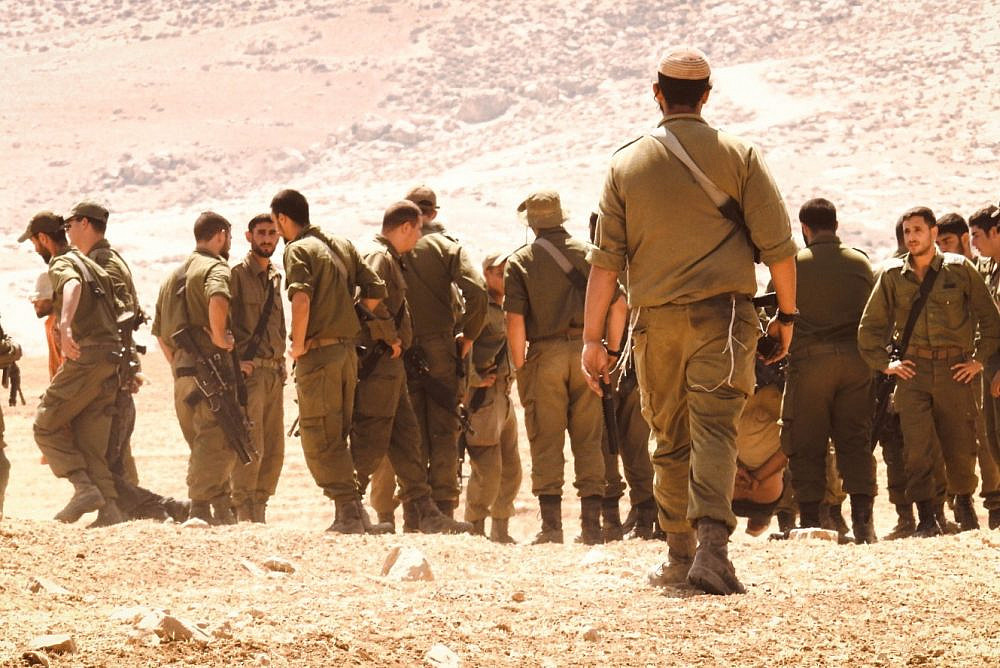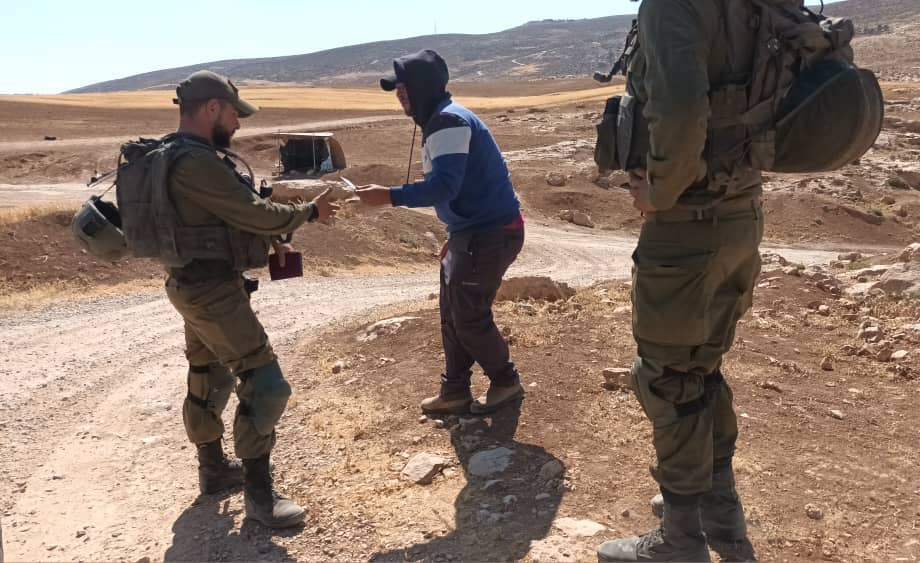On June 10 and 11, Israeli soldiers entered seven villages in Masafer Yatta, in the South Hebron Hills region of the occupied West Bank, and conducted a “census”: they went door-to-door demanding to know who lives in each house and collecting the ID numbers of every single resident. Anyone whose ID was not photographed by the soldiers was from that moment forbidden from being in the area — including medical professionals, teachers who work in the villages, and solidarity activists and journalists who regularly arrive to document and observe military and settler violence against Palestinians.
This move is just the latest step in Israel’s attempts to ethnically cleanse the Palestinians of Masafer Yatta. In May of this year, Israel’s High Court gave the state the green light to expel over 1,000 Palestinians from this area, including my own community of Tuba. Israel already deported us once from here, in 1999, when I was only one year old; that time, they loaded us onto military trucks and drove us away, before the Israeli court issued an interim injunction allowing us to return following an appeal. This time, it seems that the displacement from what Israel calls “Firing Zone 918” may look quite different — and even scarier.
In the weeks since May’s court decision, people’s lives here have become much harder. The army is hoping that by persecuting us enough they will make it impossible for us to remain, thus forcing us to leave “voluntarily.” By holding live-fire training drills next to our villages this month, for example, they are saying to us: “Your home has become our military playground. We will do whatever we want, never mind that you live here.” The census is just the latest indication of how the army plans to force us out of our homes.
“I’m scared to drive my car inside the village,” said Sameer Hamamda from Al-Fakheit, one of the villages facing the imminent threat of expulsion. “They could even catch my brother, who doesn’t live here in my house, and he would be under threat of arrest. Just a few days ago, the army stopped people who were driving from here to their home village of Jinba,” he continued. “They told them to leave the area and didn’t allow them to go back home.” Everyone who lives in Masafer Yatta, Hamamda concluded, should try and avoid moving around, in order to avoid arguments with or violence from the soldiers.
Masafer Yatta used to be an active and vibrant region. Palestinians from across the country would regularly visit to enjoy the beautiful nature in springtime. But since the court hearing, and with the Israeli army intensifying its efforts to restrict the movement of Palestinians here, people are too afraid to come. In the eyes of the soldiers, everyone is now subject to arrest for being in the “firing zone,” including the residents of the villages located inside it.
A trapped home
These new restrictions are also affecting my work as a journalist and an activist. In order to document military and settler violence in the area and speak to those affected by it, I regularly need to travel between the different villages of Masafer Yatta.
A few weeks ago, I visited the village of Al-Mirkez with photographer Emily Glick. On our way out, we encountered a “flying checkpoint” which soldiers had erected to detain anyone passing through the area — not only into Al-Mirkez but all the other villages too. The soldiers immediately stopped us and asked to see our identification, which they photographed. They told us to turn off the car and wait while the commander made some calls.
When we asked what was happening, he told us: “You are detained for entering an area that belongs to the army, which is against the law.” Legally, we had no recourse because the court has given full recognition to the military’s fabricated claims over the area. After two hours of being detained, the commander released us and ordered us to never come back here — the area in which I live. I have been arrested before in Masafer Yatta, but never ordered to stay away from my own home.
The reason for our visit to Al-Mirkez was to meet with Muhammad Makhamreh, an 18-year-old shepherd from the village whose story we published last year on the website of the #SaveMasaferYatta campaign, where we document the lives and struggles of the Palestinian residents of the area. Muhammad lost his right hand while grazing his flock near his home when he stepped on an unexploded grenade left after an Israeli army training exercise.
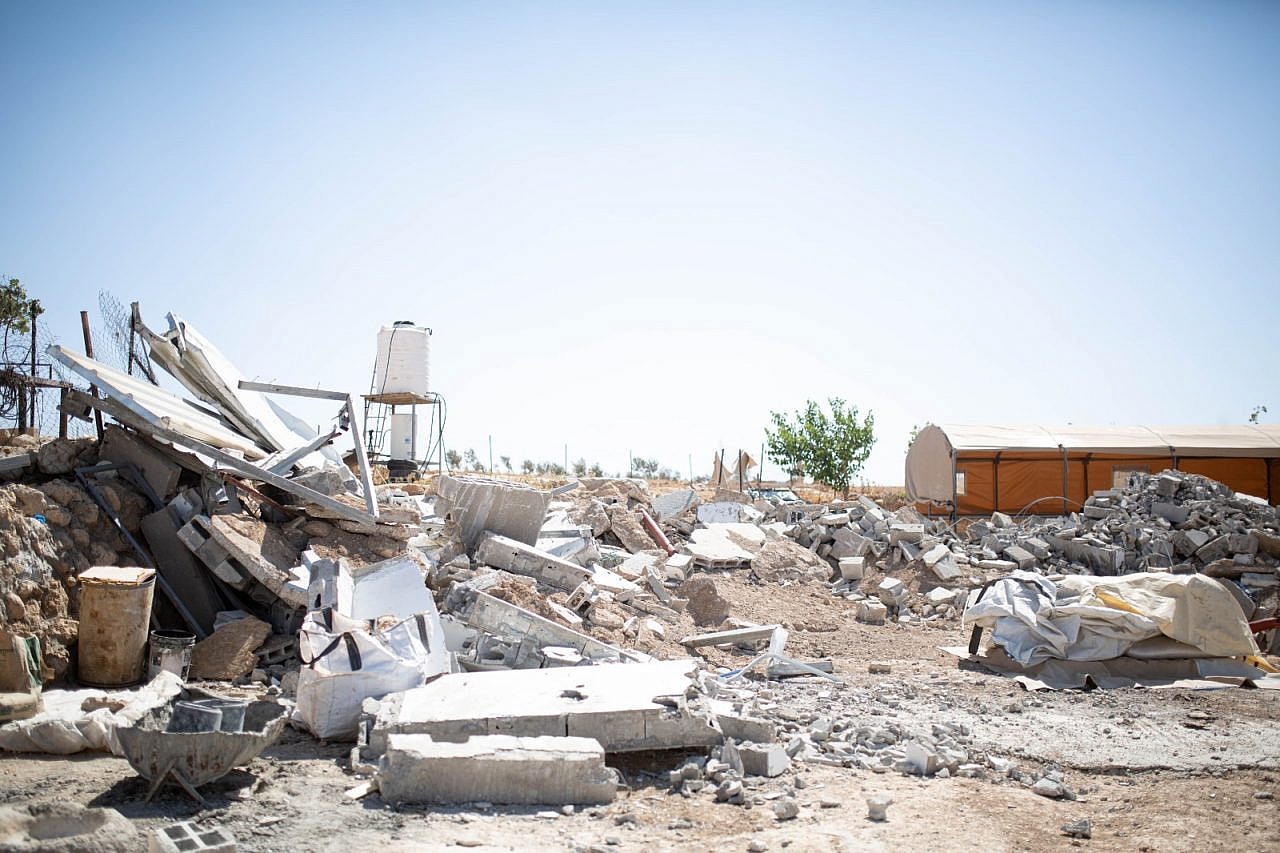
Upon entering the village this time, what caught our attention immediately was the destruction: bricks and metal sheets were strewn all over the ground, as a result of recent demolitions carried out by the Civil Administration, the civilian arm of Israel’s military government in the West Bank; the army had arrived in Al-Mirkez and the neighboring village of Al-Fakheit to destroy residents’ homes just a few days after the court ruling.
A few hundred meters before reaching Muhammad’s house, we realized we were unable to continue by car, because the Israeli army’s bulldozers had razed the fields and roads inside the village that led to his house. The house itself is now trapped: on the one side lies the Green Line, which we Palestinians from the West Bank are forbidden from crossing, and on the other side is the only road that connects the village to the rest of the West Bank, which has been destroyed by the Israeli army and blocked off with dozens of large boulders.
An open-air prison of a village
We parked the car in front of the boulders and continued on foot. When we arrived at Muhammad’s house, he was asking for help from his neighbors to shear the wool of the sheep in his family’s flock. We sat with him and his mother drinking tea while two young men clipped the herd. Muhammad can’t do this work anymore; the injury sustained from the grenade explosion has left him physically unable to carry it out.
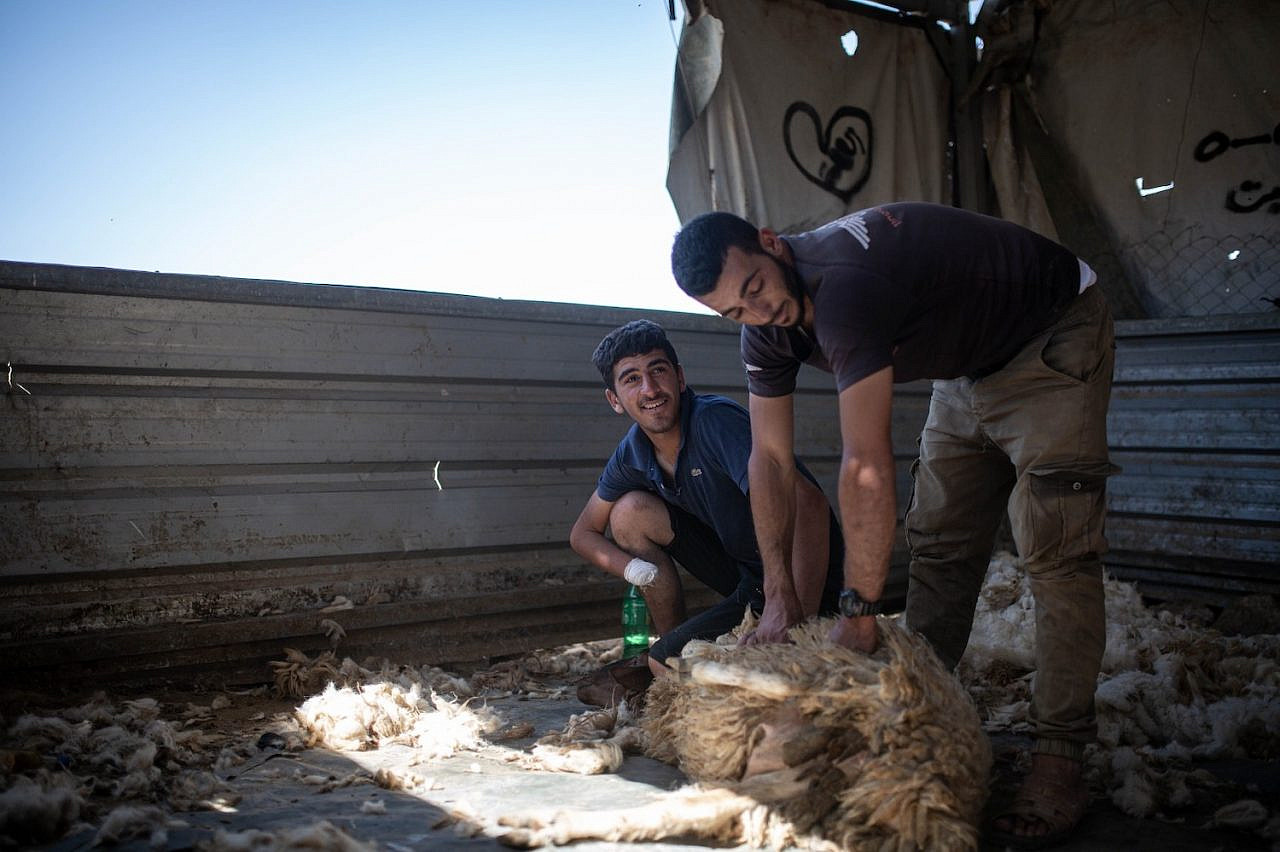
A few meters in front of the home were a series of large rocks which the army had brought in using bulldozers in order to block the road. Residents can now only get out of the trap that is their village by climbing over the rocks on foot. This means they can’t use cars or tractors to bring in food or water for themselves or their sheep, and they’re unable to leave their homes by car in the event of a medical emergency.
“We have been closed off from all over, and that’s still not enough for the military,” said Wedad Makhamreh, Muhammad’s mother. “The soldiers stand in front of our door, day and night, preventing any movement and terrorizing my children. We are not allowed to graze our sheep, even in our fields that are right next to the sheep pen. Whatever we say to the soldiers, they say to us: ‘Go away from here, this area belongs to the army.’ They even prevent me from collecting the crops that I harvested before the court’s decision, which I need to feed to my sheep.”
Wedad walked with us for the remaining few meters inside the closed-off area. It is only a small space, but the soldiers have managed to make it as unpleasant as possible. Wedad showed us her cave and the well which is the family’s only source of water in the heart of the scorching desert.
Inside the well, we could see the large rocks that soldiers had thrown down there — the same as those that had been laid around the house — in order to prevent the family from drawing drinking water up with a bucket. Wedad explained that only when the soldiers leave to rest or change who’s on duty do they have an opportunity to collect water from the destroyed well as best they can.
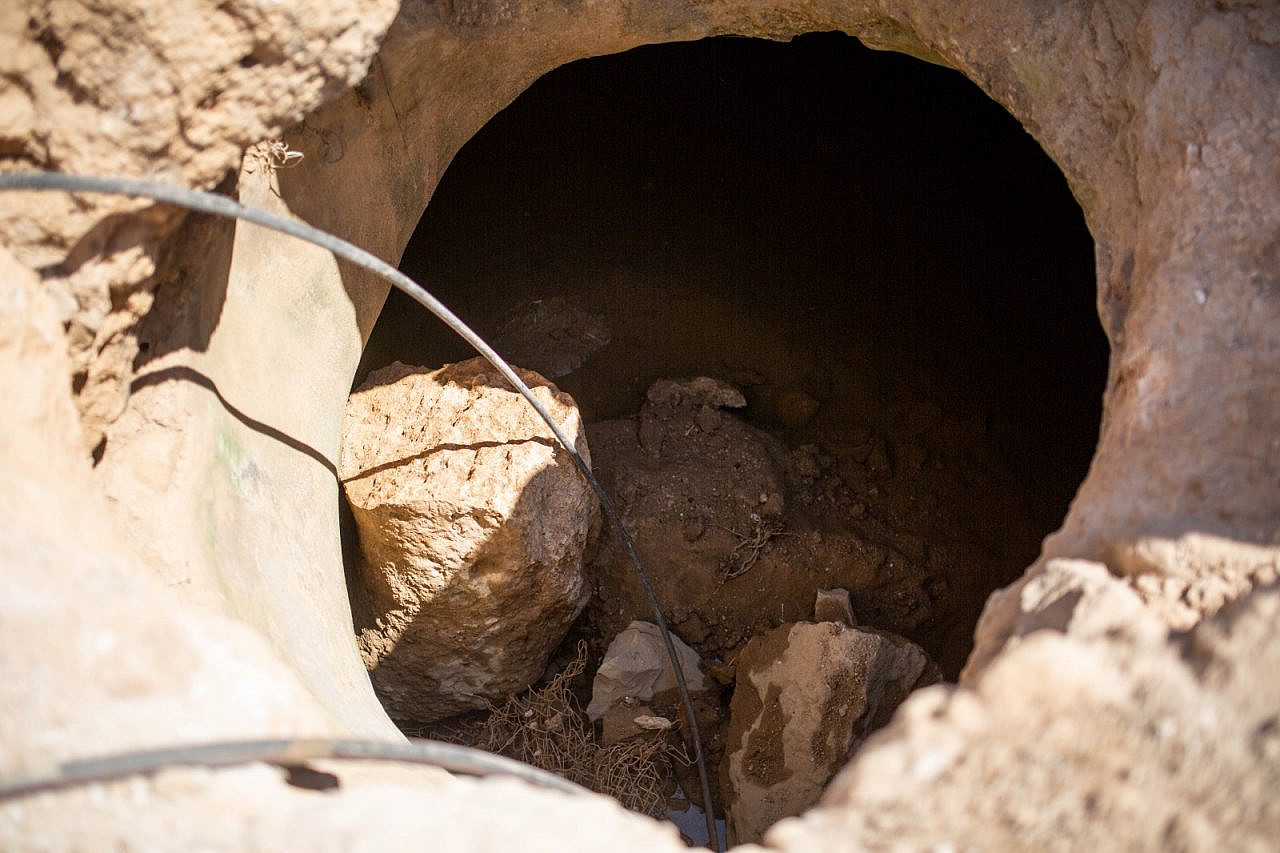
We said goodbye to Muhammad and his family and proceeded to the car we had left on the other side of the barricade. We watched as soldiers returned to monitor people’s movements in the area, inside the open-air prison of the village. Then, on our way out, the army detained us at the flying checkpoint.
Slow expulsion
Detaining us, arresting us, and restricting our movement within and between our villages are just some of the tools the Israeli army is using to try to make us leave Masafer Yatta. Some people have had their vehicles confiscated from outside of their own homes and been beaten by soldiers in the process.
Nasser Abu Obaid lives in the village of Tabban with his family of 15, including children and grandchildren. He explained that the Civil Administration entered the village right after the court ruling and presented final demolition orders for every single structure. “Every shelter, whether for us or our sheep, has been given a demolition order, including our residential rooms, sheep pens, fodder storerooms, and even water wells,” he told us. “The whole village might be destroyed at any time.”
Under the pretense of preventing entry into Masafer Yatta now that it is officially a “military zone,” the soldiers are using collective punishment against residents, including invading people’s homes — especially those who have vehicles parked outside. “While I was sitting with my family,” Nasser continued, “I saw a military jeep parked next to my car. The commander yelled at me, and I walked over to him. When I approached him, he told the soldiers to put me in the military vehicle. One soldier hit me with his gun, and I lost consciousness; when I opened my eyes again, I found myself inside the military Jeep, while the soldiers continued abusing my children.”
The army commander had decided to confiscate Nasser’s car, and when the family tried to protect themselves and the car, the soldiers responded violently. “While I was locked in the army Jeep, they told my eldest son he must drive my car to the military base. When he refused, one soldier threw a chair at him, and it hit my wife in the head,” Nasser added.
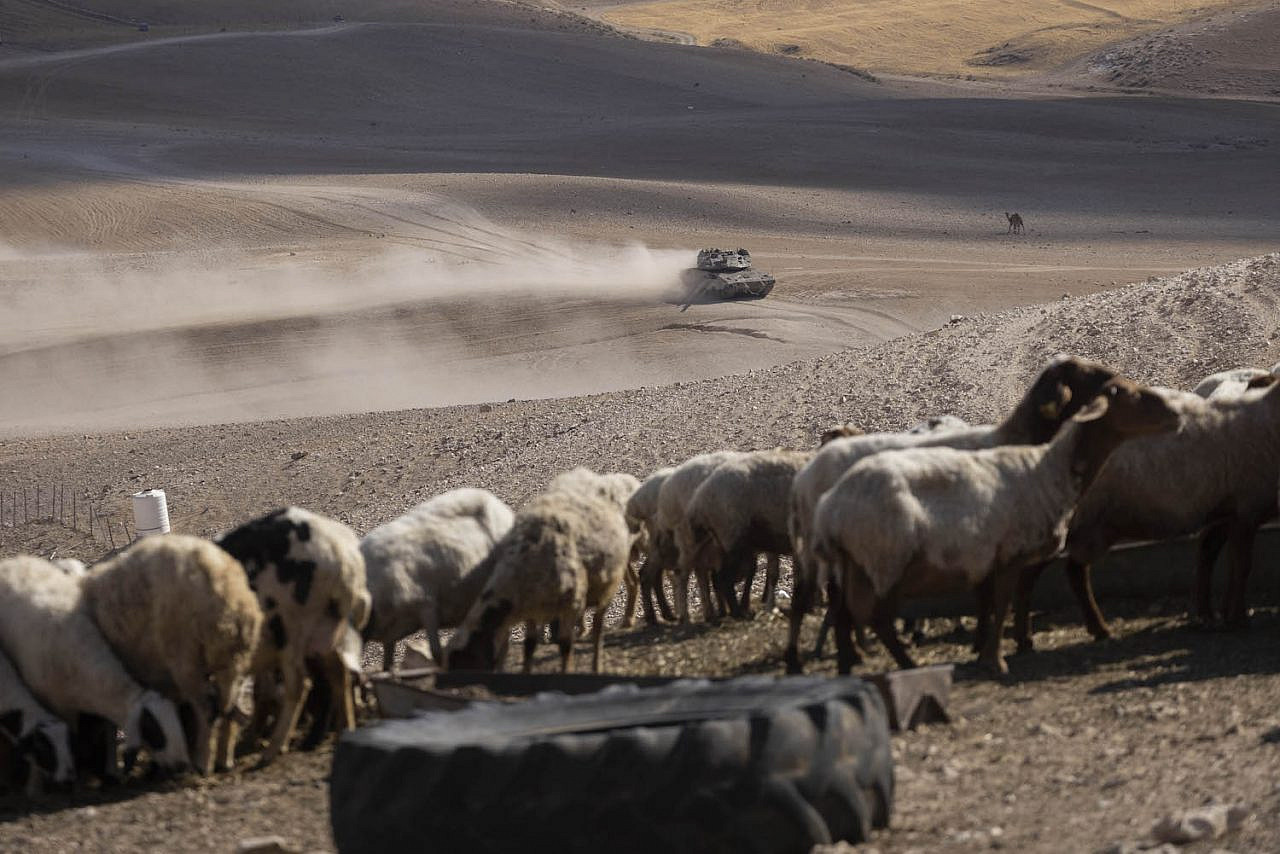
Eventually, the soldiers made Nasser drive his car to the military base, and from there they took him for an investigation. After confirming that he was in fact a resident of the area, they released him, but kept his car. “The commander took me from my home and beat me and my family up, so he knows that I’m a resident living here, but doing this is a way to prevent us from having visitors and threatening us if we use cars, so that we can’t move around,” explained Nasser.
The next day, Nasser took his car keys and documents and went to the military base to retrieve his car, as the investigator had promised he could. But after many hours of waiting and being constantly rebuffed, Nasser saw his car being driven away on a tow truck. From there it was taken to a detention center in Gush Etzion, south of Bethlehem. Although Nasser was supposed to get his car back on the same day as the confiscation, he was made to wait 18 days and pay a fine of 2,200 NIS to get it back.
It took only a few short days for us to see how the court ruling that authorized the state to expel us from our homes in Masafer Yatta would ruin our lives. What is happening now is clearly a policy of slow expulsion. They’re not arriving with trucks to deport us en masse, but the end goal is exactly the same.

